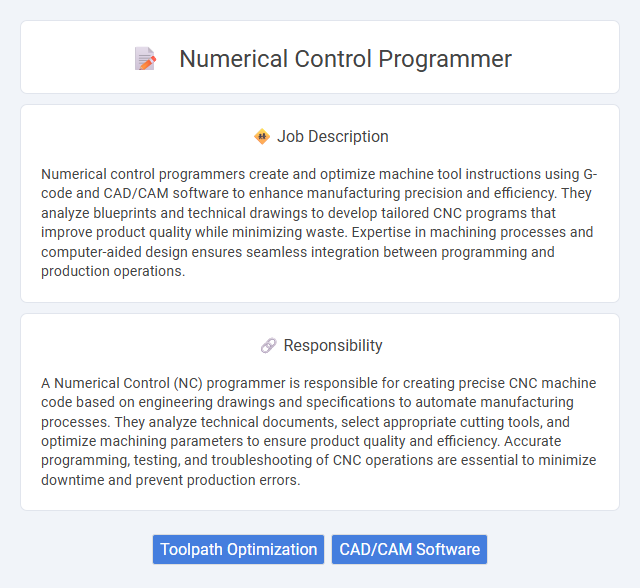
Numerical control programmers create and optimize machine tool instructions using G-code and CAD/CAM software to enhance manufacturing precision and efficiency. They analyze blueprints and technical drawings to develop tailored CNC programs that improve product quality while minimizing waste. Expertise in machining processes and computer-aided design ensures seamless integration between programming and production operations.
Individuals who are detail-oriented and possess strong problem-solving skills will likely find a numerical control programmer role suitable. Those comfortable with technology and precision work are probably better equipped to handle the job's demands effectively. People who prefer routine tasks over creative problem-solving might find this position less fitting for their abilities.
Qualification
A Numerical Control (NC) programmer requires strong proficiency in computer-aided design (CAD) and computer-aided manufacturing (CAM) software to develop precise machine tool instructions. Expertise in G-code programming and a solid understanding of machining processes, materials, and tolerances are essential for accurate and efficient production. A background in mechanical engineering, manufacturing technology, or related fields combined with hands-on experience in CNC machining ensures optimal program development and troubleshooting skills.
Responsibility
A Numerical Control (NC) programmer is responsible for creating precise CNC machine code based on engineering drawings and specifications to automate manufacturing processes. They analyze technical documents, select appropriate cutting tools, and optimize machining parameters to ensure product quality and efficiency. Accurate programming, testing, and troubleshooting of CNC operations are essential to minimize downtime and prevent production errors.
Benefit
A Numerical Control (NC) programmer role likely offers significant benefits such as competitive salaries and opportunities for professional growth in the manufacturing sector. Job stability and the chance to work with advanced technology might enhance career prospects and job satisfaction. Access to continuous training and skill development could further support long-term career advancement.
Challenge
A Numerical Control (NC) programmer likely faces complex challenges in translating engineering designs into precise machine instructions, requiring a high level of technical skill and attention to detail. They probably encounter difficulties in optimizing programs to enhance production efficiency while minimizing errors and material waste. The role may also involve adapting to rapidly evolving CNC technologies and troubleshooting issues that arise during manufacturing processes.
Career Advancement
Numerical control programmers develop and optimize CNC machine instructions, crucial for manufacturing precision components in automotive, aerospace, and industrial sectors. Advancing in this career often involves mastering advanced programming languages such as G-code and M-code, gaining expertise in CAD/CAM software like Mastercam or SolidWorks, and obtaining certifications like FANUC or Siemens CNC programming. Leadership roles such as CNC programming supervisor, manufacturing engineer, or automation specialist typically follow with increased experience and technical proficiency.
Key Terms
Toolpath Optimization
Numerical control (NC) programmers specialize in optimizing toolpaths to enhance machining efficiency and precision, significantly reducing cycle times and minimizing tool wear. Advanced software tools and algorithms are employed to create smooth, collision-free paths that maximize material removal rates while ensuring strict adherence to design specifications. Effective toolpath optimization directly impacts production costs and quality, making it a critical skill in CNC machining and manufacturing environments.
CAD/CAM Software
Numerical control programmers specialize in creating and optimizing CNC machine tool instructions using advanced CAD/CAM software such as Mastercam, SolidCAM, and Fusion 360. Proficiency in these platforms enables precise toolpath generation, simulation, and modification to enhance machining accuracy and efficiency. Expertise in translating engineering designs into machine-readable code directly impacts production quality and cycle times in manufacturing environments.
 kuljobs.com
kuljobs.com